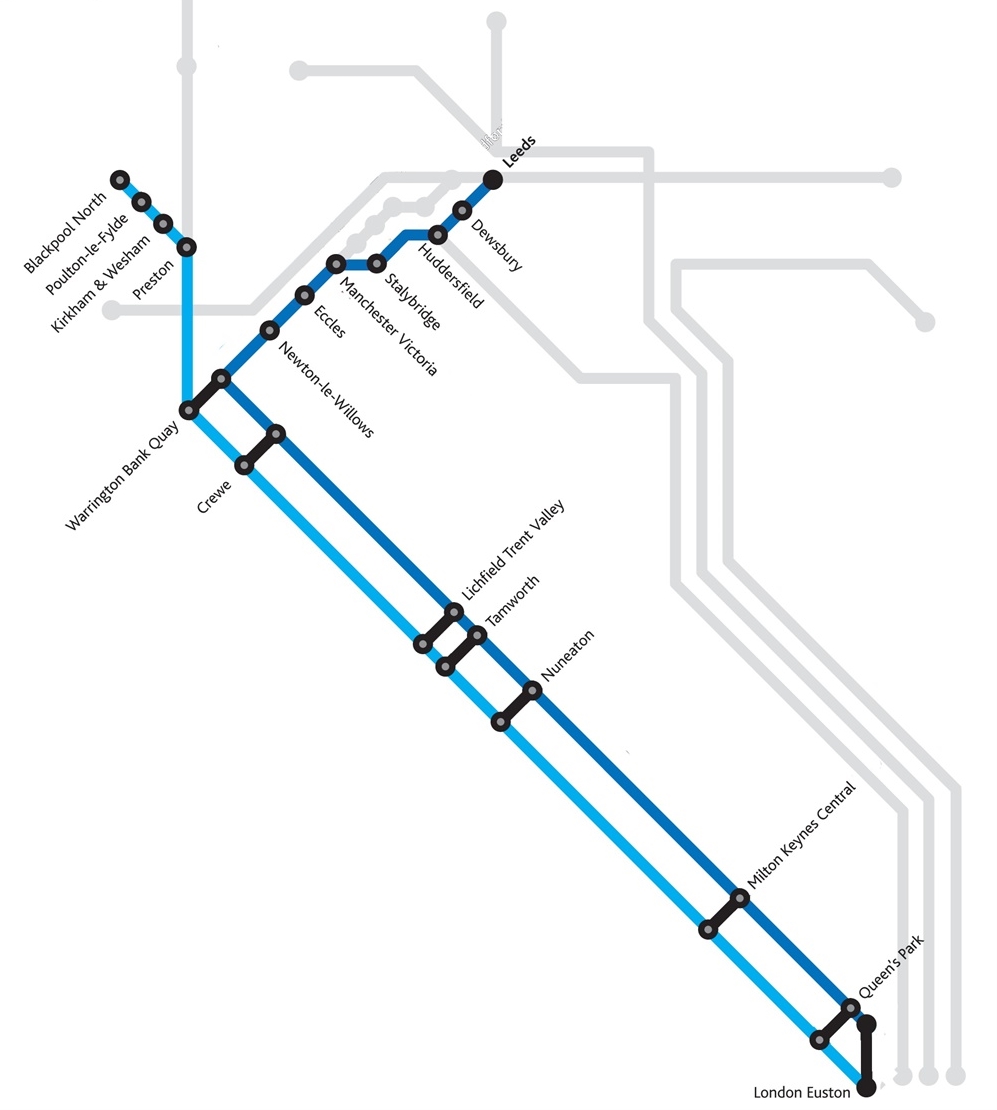09.01.15
ORR rejects new open access long distance services on West Coast Main Line
The Office of Rail Regulation (ORR) has rejected proposals by Great North Western Railway (GNWR) to provide new open access long-distance services on the West Coast Main Line (WCML) from London to Blackpool, Leeds and Huddersfield.
GNWR sought access rights until 2027 to operate six daily off-peak return services from London to Blackpool from May 2017 and six daily off-peak services from London to Leeds via Huddersfield from December 2018. To run the services it had planned to lease a fleet of eight new six-car Alstom Pendolino EMUs.
The operator, along with Great North Eastern Railway (GNER), is part of Alliance Rail Holdings, an Arriva subsidiary. Alliance had previously sought a more extensive track access agreement that also included services to Bradford and Carlisle, but this was rejected by the ORR in December 2013 because of capacity constraints at the southern end of the WCML.
Network Rail backed the GNWR application for the new services, saying they could be accommodated with better use of existing capacity, particularly after reworking the timetable. It cited the Northern Hub project to increase rail capacity in the Manchester area and the coming electrification of the TransPennine routes as a reason for backing the plan, however timetable modelling indicated that running a sixth hourly fast train would have significant negative impacts on punctuality on this line. Network Rail suggested that reduced signalling headways would be required to accommodate this level of traffic.
The ORR carried out a five-stage analysis of the proposals to establish whether the services would draw revenue away from franchised services, known as the ‘not primarily abstractive’ (NPA) test.
This test is complex, and the calculations are explained in detail in the decision letter. In it, the ORR says: “We would not expect to approve applications that did not generate at least 30p of new revenue for every £1 abstracted from existing operators. We set the threshold at this relatively low level with the benefits of competition firmly in mind.”
The mid-point NPA ratio for GNWR's proposal was 0.26 (i.e. 26p of new revenue for every £1 extracted), which rose slightly to 0.29 when GNWR revised its proposed timetable – just under the 0.3 threshold.
But the ORR said: “Overall on the NPA test we concluded that the application was at best marginal in certain circumstances, on a ratio which is already weighted in favour of an open access application.”
It was also concerned over the impact of additional fast services on the TransPennine route and delays to electrification, so the application was refused.

Ian Yeowart, managing director of GNWR, said: “We are naturally disappointed with the ORR’s decision, especially as we reached agreement with Network Rail in May last year that there was sufficient capacity to operate these trains on the WCML and across the Pennines. That disappointment will be shared by residents and businesses in a number of northern towns and cities, most notably Blackpool and Huddersfield, which would have received new regular direct services to London as part of the plans.
“The ORR’s reasons came as something of a surprise to GNWR. Particularly as GNWR was told last July that forecasts of generation from the first part of the five-stage test were relatively high compared with previous open access applications that have been approved by the ORR.”
He added that back in 2011, when a previous application was rejected on capacity grounds, the revenue test comfortably exceeded the threshold required for approval.
Yeowart pointed to the East Coast Main Line, where Grand Central and Hull Trains have for a number of years successfully provided new services and competition with the franchised operator, East Coast Trains.
He said this competition on the ECML has kept fare rises below the national average, but the franchise operator has still paid increased premiums to the government year on year. In contrast the benefits of open access competition have now been "denied" to those passengers in the north west of England.
But the ORR said: "We note the absolute impact on the funds available to the Secretary of State is broadly comparable with the totality of open access applications we have approved on the ECML. But in this case the impact occurs more quickly because the services are introduced in two stages rather than developing more slowly over time."
The ORR letter also revels DfT concerns that GNWR's proposed new services "would undermine the business case for the expanded TransPennine investments it was now considering with Network Rail. In particular, it suggested the Benefit to Cost ratio of the wider project might fall from 2.12 to between 1.34 and 1.4 were GNWR to run services between London and Leeds rather than a DfT franchisee running an alternative service between, say, Manchester and York. This would reduce the value for money category of the project from high to low."
GNWR is now reviewing the ORR’s decision letter to decide what to do next. In the meantime, GNER is continuing with its application, lodged with the ORR early in 2014, to operate new fast services between London King’s Cross and Edinburgh, and to Cleethorpes and Bradford.
An ORR spokesman said: “The board of the ORR has decided not to approve an application from the GNWR Company for new off-peak train services between Yorkshire, Lancashire and London via the WCML.
“ORR considers a range of duties when making access decisions, and assesses the impact of new services not just on the passengers benefiting directly from those services but all users of railway services.”
(Image Source: GNWR)
Tell us what you think – have your say below or email [email protected]